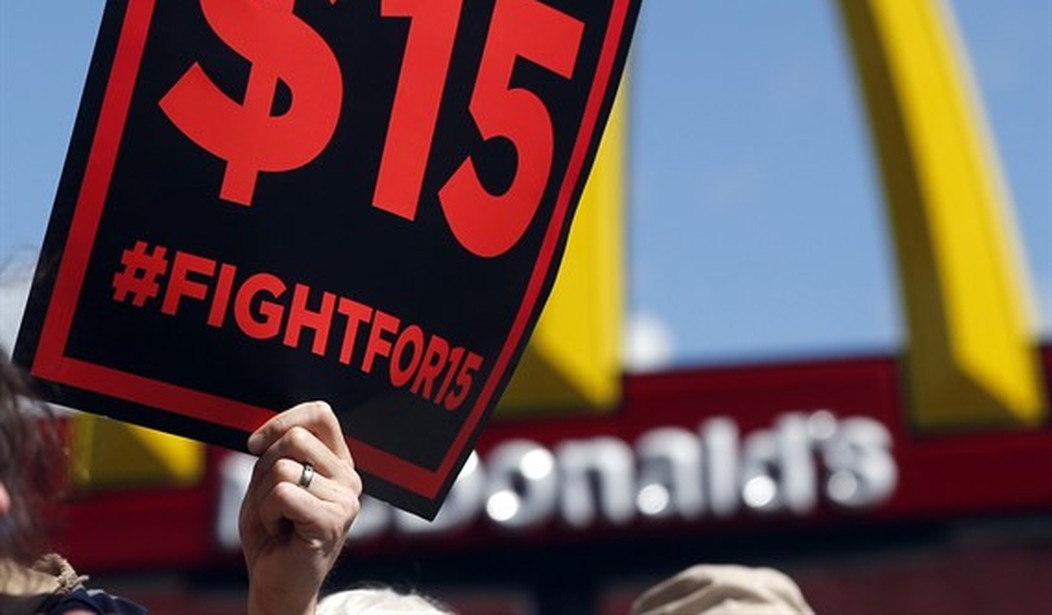This story has flown under the radar over the weekend while conservative and GOP attention was focused on the events at CPAC in Orlando — Senate Democrats spent the weekend trying to figure out a way to punish US corporations who refuse to pay their workers a minimum wage of $15 an hour — even though such wage is not required by law.
Late last week, the Senate Parliamentarian issued an opinion that the hike in the federal minimum wage to $15 an hour, passed by the House in its COVID relief bill, is not legislation that can proceed through the Senate as part of the “Budget Reconciliation” process with the House and cannot be passed as part of the Senate’s COVID Relief bill. “Budget reconciliation” is limited to matters which involve the “tax and spending” processes of Congress, and raising the federal minimum wage rate to $15 an hour does neither.
The Senate parliamentarian told lawmakers Thursday night that the proposed increase to the minimum wage to $15 an hour didn’t comply with Senate rules, dealing a blow to Democrats’ efforts to include it in their $1.9 trillion coronavirus relief package.
The parliamentarian, the neutral arbiter of the chamber’s rules, issued guidance saying she believed it didn’t meet the guidelines for reconciliation, the process that Democrats are using to pass their relief plan to pass the aid package with a simple majority in the Senate, and would be ruled out of order.
Any such legislation can only proceed by regular order and it would be subject to the legislative filibuster — meaning 60 Senators would be needed to vote in favor of ending debate before a vote to actually raise the minimum wage could take place.
In response to the ruling, over the weekend, some Senate Democrats tried to come up with implementing language for “Plan B” to achieve similar ends by imposing financial penalties on businesses that did not agree to pay workers a minimum wage of $15 an hour.
News of the “Plan B” alternative first appeared in the media on Friday:
As an alternative, Senate Majority Leader Chuck Schumer is now eying imposing penalties for corporations offering less than a $15 minimum wage as part of the relief package, which stands as the new administration’s first big legislative priority and the first chance Democrats have to show they can deliver on their promises now that they control both chambers of Congress and the White House.“Schumer is looking at adding to Senate COVID bill a new provision to penalize large corporations that don’t pay their workers at least a $15 minimum wage,” a senior Democratic aide told CNN on Friday.
Consider the logic employed — the Democrats were trying to write a law that would punish employers for failing to comply with a different law which they were unable to pass.
CNN is reporting today that this “alternative” — “Plan B” — has been abandoned after Senators involved in the discussion struggled to come up with language to describe such a “penalty” as a tax that could be passed as under the budget reconciliation rules.
Senate Democrats had a difficult time crafting the tax provisions in their alternative minimum wage proposal, sources said, so they are looking at other potential avenues to boost the rate. Yet it underscores the dire chances of boosting the wage after the parliamentarian’s ruling.If they can’t find an alternative rate hike to fit into the budget reconciliation bill, which they’re trying to pass by the middle of March, they will have to try to pass such a plan through regular order, meaning 60 votes would be needed in the 50-50 Senate.
Only Democrats would consider crafting a proposal to add to a COVID relief measure that would penalize US companies for refusing to increase their labor costs at a time that most of those same companies are under financial pressure from the effects of the worldwide pandemic — financial pressure that has forced many of the companies to lay off workers already.
Based on their comments to date, it’s entirely likely that Schumer never had 50 votes for a $15 wage even if the Parliamentarian’s ruling had gone in his favor. Joe Manchin was already on record opposing the hike, as was Krysten Sinema of Arizona.
If the decision had gone the other way, Schumer would have either had to compromise on the minimum wage issue or make a “bet it all” wager on the fact that Manchin and Sinema would not vote against the entire package just because they opposed the minimum wage provision. That would have been a huge gamble for Schumer in his first month as Majority Leader, and for the Biden Administration which is having trouble delivering on many of its campaign promises regarding COVID.
House Democrats who voted in favor of the minimum wage increase in their COVID relief bill recognized the smoke signals coming from the Senate and sent an “Open Letter” to the Senate demanding that Vice President Harris overrule the Parliamentarian’s Opinion, and include the House-passed provision in the Senate’s COVID bill to be voted upon.
Rho Khanna released the letter earlier today to Senate Democrats:
.@RoKhanna and other progressive House Democrats ask Vice President Kamala Harris to ignore the ruling of the Senate’s parliamentarian and decide that the $15 federal minimum wage can stay in the covid relief package during Senate floor debate this week. pic.twitter.com/FCkFQSUVzV
— Jake Tapper (@jaketapper) March 1, 2021
This federal minimum wage is more of an activist issue and a campaign pledge than it is an issue being actively pursued by some large component of the Democrat Party constituency. Many states have state minimum wage laws where the rate set is already above the current federal minimum wage. It is not the kind of issue that causes people to leave the party over the failure to pass the new legislation increasing the rate.
But the status of the issue does expose the very narrow margins that Schumer has to work with in the Senate.















Join the conversation as a VIP Member